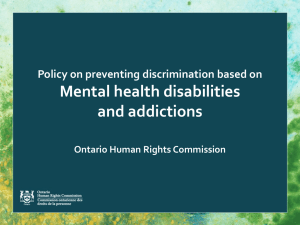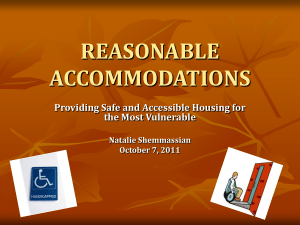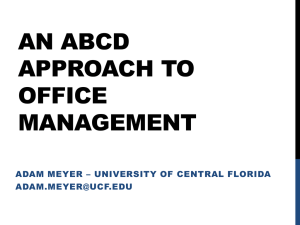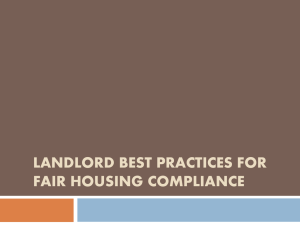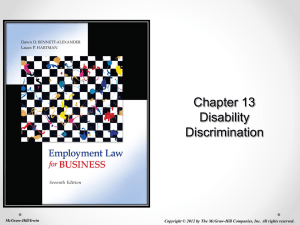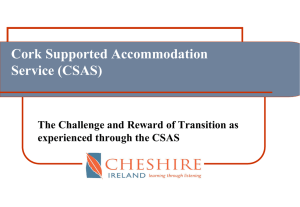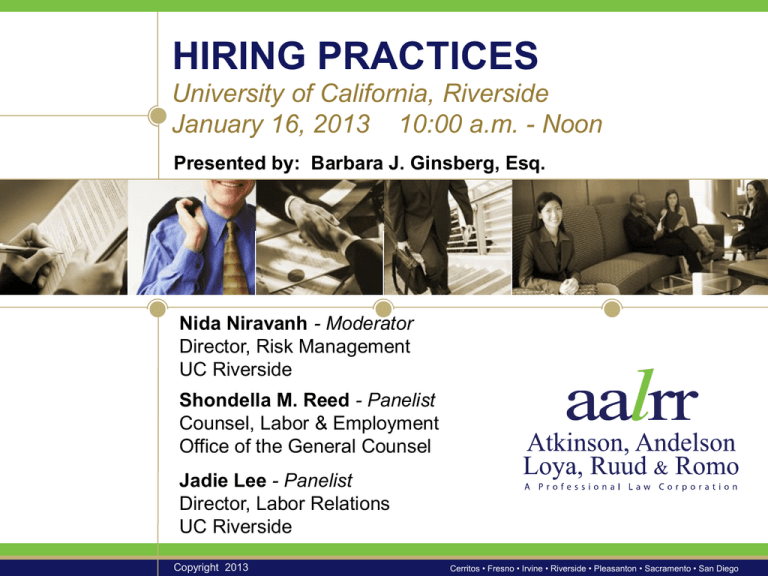
HIRING PRACTICES
University of California, Riverside
January 16, 2013 10:00 a.m. - Noon
Presented by: Barbara J. Ginsberg, Esq.
Nida Niravanh - Moderator
Director, Risk Management
UC Riverside
Shondella M. Reed - Panelist
Counsel, Labor & Employment
Office of the General Counsel
Jadie Lee - Panelist
Director, Labor Relations
UC Riverside
Copyright 2013
Cerritos • Fresno • Irvine • Riverside • Pleasanton • Sacramento • San Diego
AGENDA
RULE SOURCES
• Federal, State, and Local Laws to be Aware of
During the Hiring Process
DISCRIMINATION
• Disparate Treatment; Disparate Impact;
English Only/Preferred
DISABILITIES AND
REASONABLE
ACCOMMODATION
• ADA, Rehab Act of 1973, FEHA; Overview of
Laws; Questions and Medical Exams
CONVICTIONS AND
POLYGRAPHS
• Labor Code and EEOC Guidance
IMMIGRATIONRELATED INQUIRIES
• Tips and Guidance
2
AGENDA
APPLICATION
STATEMENTS
• What the application reveals directly or by
omission
INTERVIEWS
• Tips to keep the interview productive and fair
BACKGROUND
CHECKS
NEGLIGENT HIRING
PROBATIONARY
PERIOD
• Obtaining Info; Providing Info; Defamation
• Obligation and liability
• Using the employee release option
3
Hiring Practice “Rule” Sources
1 U.S. Constitution
2
Federal Law
3 Federal Regulations
4 State Constitution
5 State Law
6 State Regulations
7 Collective Bargaining Agreement
8
University Policies and Administrative Procedures/Regs
9 Past Practice
4
Important EEO Concerns when Hiring
• Discrimination against Protected Classifications
– Federal: Title VII
– State: Fair Employment and Housing Act (FEHA)
• Disability Discrimination
– Federal: Americans With Disabilities Act (ADA) and
Rehab Act of 1973
– State: Fair Employment and housing Act (FEHA)
Prohibited Discrimination - Protected Characteristics
Race / National Origin / Color / Ancestry
Gender / Sex / Pregnancy
Age
Religious Creed
Physical or Mental Disability / Medical Condition
Sexual Orientation
Gender Identity
Association / Perception
Marital Status / Military Status
6
Title VII and FEHA – General Discrimination
• Prima Facie case:
– Protected Characteristic
DISPARATE
TREATMENT
DISCRIMINATION
– Qualified Individual
– Adverse Action
• Legitimate Business
Reason
• Pretext
7
Title VII and FEHA – General Discrimination
DISPARATE
IMPACT
DISCRIMINATION
• Policy or practice neutral
on its face that has a
disparate impact on a
protected characteristic
group; and
• Other non-discriminatory
alternatives exist
8
May we require
bilingual skills?
May we prefer
bilingual skills?
May we require
English-only or
English
competence?
9
Conduct Job Analysis to
Determine Required or
Preferred Skills
• Set minimum qualifications
• If using pre-employment tests,
utilize examinations that test for
the applicant’s ability to perform
the duties of the position
• All pre-employment tests must
be reviewed and validated by
HR before use
10
Laws Protecting Disabled Workers
Americans with Disabilities Act – Title I
(Federal)
• Prohibits employers of 15+ employees from
discriminating against “qualified” individuals with
disabilities
• Requires reasonable accommodation for known
disability of qualified applicant or employee unless
undue hardship, or direct safety threat
11
Laws Protecting Disabled Workers
Americans with Disabilities Act – Title I (Federal)
• Disability =
• Physical/mental impairment
that “substantially limits” one
or more “major life activities”
as determined without regard
to mitigating measures
• Record of such impairment
• Being regarded as having
such impairment
• Major life activity =
• Tasks & functions of central
importance to daily life
• Qualified =
• Meets job requirements
• Can perform essential job
functions with or without
reasonable accommodation
• No direct threat to safety or health
of self or others
• Essential Functions =
• Position exists to perform function
• Function requires expertise or
specialized skill
• Limited # of employees available
to perform function
12
Laws Protecting Disabled Workers
Americans with Disabilities Act – Title I (Federal)
• “Reasonable” accommodation
• Modification that would allow the
employee to perform the
essential functions of the job
without altering the major
purposes of the job
• Only must provide if “qualified”
individual with known disability
• Can’t impose undue hardship on
the employer’s operation
• Employer must engage in interactive
process with employee with known
disability
• Reasonable accommodation is not
necessarily employee’s preferred
accommodation, rather just an
effective one
• Employee may reject proposed
accommodation
• Enforced by EEOC and employers
directly liable for policies and
vicariously liable for supervisors
• Remedies are reasonable
accommodation, reinstatement,
damages (pay, future losses, pain
and suffering), attorneys fees &
costs
13
Laws Protecting Disabled Workers
Rehabilitation Act of 1973
(Federal)
• Covers employers with federal
government contracts of $2,500 or more,
or who receive financial assistance.
• Substantially similar to Americans with
Disabilities Act
14
Laws Protecting Disabled Workers
Fair Employment & Housing Act
(California)
• Prohibits employers with 5+ employees from
discriminating against person based on physical
disability, medical disability, or medical condition.
• Greater protection against discrimination than
ADA
• Requires reasonable accommodation of known
disability or at request of employee for
accommodation, unless undue hardship or would
endanger health and safety of employee or others
15
Laws Protecting Disabled Workers
Fair Employment and Housing Act (California)
• Disability =
• Physical/mental disability or
medical condition that “limits”
(makes “difficult”) one or more
“major life activities” as
determined without regard to
mitigating measures
• Mental/psych disorder/health
impairment requiring special ed
• Being regarded as having such
impairment
• Major life activity =
• Physical, mental, social
activities and working
• Qualified =
• Meets job requirements
• Can perform essential job
functions with or without
reasonable accommodation
• Perform duties in manner that
won’t endanger to safety or health
of self or others
• Essential Functions =
• Position exists to perform function
• Function requires expertise or
specialized skill
• Limited # of employees available
to perform function
16
Laws Protecting Disabled Workers
Fair Employment and Housing Act (California)
• Reasonable accommodation is not
necessarily employee’s preferred
• Accommodation that would allow
accommodation
the employee to perform the
• Enforced by FEHC
essential functions of the job
without altering the major
• Employers directly liable
purposes of the job
supervisors/co-workers engaging in
harassing or retaliatory conduct
• Can’t impose undue hardship on
directly liable
the employer’s operation
• “Reasonable” accommodation
• Employer must engage in timely,
good faith interactive process with
employee with known disability or if
employee requests accommodation
• Remedies are reasonable
accommodation, reinstatement,
hire, transfer, promotion, tenure,
damages (pay, future losses, pain
and suffering), attorneys fees &
costs, out of pocket expenses,
training
17
Questions and Medical Exams
Can I ask an applicant
whether she is disabled or
about the nature or severity
of a disability?
No. You may ask about
ability to perform jobrelated functions and can
ask them to describe or
demonstrate how the job
function will be performed
with or without reasonable
accommodation
Can I require an
applicant to take a
medical exam?
Only after a job offer is
made and prior to the
commencement of duties
and only if everyone
working in the job
category must also take
the exam
18
Questions and Medical Exams
What happens if I don’t hire
because the pre-employment
exam shows a disability?
You’ll need to be able to
show reasons for not hiring
are job-related and
consistent with business
necessity, and that no
reasonable accommodation
could have been made that
would have made it
possible to perform
essential job functions
Once an employee is
hired, can I require a
medical exam or ask
questions about
disabilities?
Only if you can show the
exam or inquiry is jobrelated and consistent
with business necessity
(based on objective
evidence)
19
Convictions
• Labor Code §432.7
– Can’t ask applicant to disclose orally or in writing
information concerning an arrest/detention that did not
result in conviction, or referral to or participation in a
diversion program, and employer can’t factor any record
of the same into an employment decision
– Convicted of a felony or misdemeanor via plea, verdict,
finding of guilty (don’t rely on arrest as evidence of
criminal conduct, but OK to consider underlying conduct)
– Include statement that a conviction does not necessarily
disqualify an applicant
Convictions
• See also EEOC Guidance
– Consider nature of conviction, date of conviction, age at
time of conviction, and circumstances of conviction
– Look at the nature of the job and determine nexus
between conviction and ability to perform job
• Labor Code §432.2 – No compelled polygraphs
Convictions
• Should you check the Megan’s Law website?
• Labor Code §290.46(j)(2)
– OK if the information gathered is used to protect a
person who “is or may be exposed to a risk of
becoming a victim of a sex offense by the
offender.”
• Be sure to get a written waiver to conduct a DOJ
criminal background check
Immigration-Related Inquiries
May I ask an applicant if, in the
event he/she is hired, he/she will be
able to provide verification of his/her
legal right to work in the United
States?
Yes, but you can’t require
the documentation until
after the applicant is hired.
Be sure to specify what
constitutes appropriate
verification documentation
What if we become
aware of the fact the
employee lacks the
legal right to work in the
U.S.?
You may use this as a
basis for terminating
employment with
appropriate due process
23
Certification
Include a statement
on the application
wherein the applicant
certifies the
information provided
is true and correct
and that no material
information has been
omitted
24
Look Closely at the Job Application
Job Hopping? Gaps in employment?
Inflated Position Titles? Puffery?
Actual Job Responsibilities
Salary History
Reporting Relationships
Education
Actual Experience
Writing Ability
INTERVIEWS
• Complete training on
recruitment and training
practices
• Ask Open-Ended Questions
– Who, What, When, How, Why
• Ask Questions About
Experience and Situations
• Consistent Questions for all
Interviewees
26
Background Checks
Obtain a signed written waiver to make inquiries
and comply with Fair Credit Reporting Act
Obtaining
Information
Protect personal and confidential information
Limit the number of people who conduct checks
Beware of defamatory statements
Know who is authorized to provide information
Providing
Information
Limitations on disclosure of performance
information absent a current written release
Procedures for internal (UC system) requests for
employee information vs. external requests
Do not make defamatory statements
27
DEFAMATION
• Intentional
• False Statement
• Defames Individual’s Reputation
• Immunity May or May Not Be Available
28
Additional Issues
NEGLIGENT HIRING
• Employer has a duty to exercise reasonable care
in hiring (and retaining) employees and to avoid
exposing third parties to an unreasonable risk of
injury
• Employer must take reasonable steps during the
hiring process to satisfy this duty
• Thoroughly complete all steps of hiring process
(background, criminal, pre-employment tests,
references, driving (if appropriate) to determine
fitness for duty and whether prone to violence
29
Additional Issues
PROBATIONARY PERIOD
• If an employee is not performing to standards,
release the employee during the probationary
period
• Ensure provisions of the CBA are followed
(specific timelines; may also include
remediation attempts)
• Ensure adequate documentation (employee
may still file action)
30
Question
Answer
Session
Thank You
For additional resources, training, or information,
please contact:
Barbara J. Ginsberg
Attorney at Law
(562) 653-3200
Bginsberg@AALRR.com
www.AALRR.com
Sue Anderson
Staff Employment and
Development Manager
UCR
Sue.Anderson@ucr.edu
hr.ucr.edu
Lorena Velasquez
Principal Employment
Analyst, UCR
Lorena.Velasquez@ucr.edu
hr.ucr.edu



